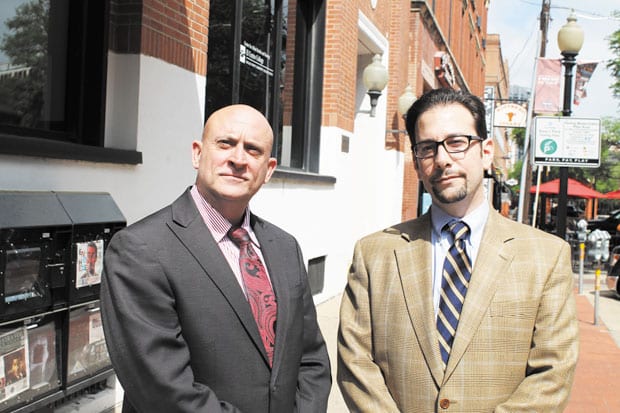Agency claims county changed the rules — its story — several times through the bidding process

Bret Camp and Jonathan Petrus attended Dallas County Commissioners Court meetings earlier this spring to request inclusion in Ryan White funds distribution. (David Taffet/Dallas Voice)
DAVID TAFFET | Senior Staff Writer
AIDS Healthcare Foundation filed a lawsuit against Dallas County this month for excluding it from receiving Ryan White funding to provide services to people HIV.
AHF filed a grievance in March and filed, but did not serve, a lawsuit. After receiving information from a Freedom of Information request that it had been recommended for — but not awarded — a $1.1 million grant, it served the lawsuit earlier this month.
AHF, which operates three clinics in Texas claims Dallas County changed its requirements several times during the application period and accuses it of creating rules that specifically exclude the organization.
AHF Texas Regional Director Bret Camp expressed his frustration in the process.
“The process was not transparent,” he said.
He said Dallas County’s own needs assessment showed the area needed more HIV/AIDS care providers based on geography and demographics to reach unserved populations. AHF’s Dallas facility is the first to serve North Dallas and is adjacent to a zip code with one of the highest rates of HIV in the county.
Applicants, according to the grant rules, had to be “incorporated for a minimum of three years prior to submission of a proposal.” Or so, they were originally told.
AHF has been incorporated since the 1980s, but they sent questions to the county to clarify.
In December, AHF was told applicants had to be incorporated in Texas and, if connected to a national organization, had to have its own Texas incorporation in place three years. The organization has been incorporated in Texas two years.
In its complaint, AHF calls this method of excluding it “unethical and impermissible under state and county law.”
When AHF objected, county officials told the organization disputes are subject to a grievance process, so it requested a copy of the grievance process on Jan. 5. Instead of dealing with a grievance, two days later, the county changed its position on incorporation within the state to only having to provide evidence of authorization to transact business in the state with the secretary of state.
On Feb. 25, the agency received a letter saying its proposal was disqualified because it didn’t submit a “certificate of registration” from the secretary of state, a document AHF claims doesn’t exist. Without the documents, the county wouldn’t have scored the application.
In March, AHF received the grievance procedure from the county that it requested in January. A few days later, it was told its request had been scored, but it received low marks.
AHF filed its grievance. Although the county has 23 days to respond, AHF didn’t hear from them until June 10. It was told it hadn’t submitted proper documents, which indicates the county didn’t score the application.
Because the process wasn’t transparent, Camp said he filed a Freedom of Information request with Dallas County for papers relating to its application for Ryan White money. He said he needed that paperwork to understand why it had been denied funding and to support any claim his organization had against the county.
The request was delayed when the county requested a ruling from the attorney general who directed it to comply.
“What we found was shocking,” Camp said.
The documents received on July 2 not only scored AHF on a par with other agencies that were awarded funding, but the Ryan White External Review Committee recommended AHF to receive $1.1 million in funding for outpatient medical services.
This article appeared in the Dallas Voice print edition July 17, 2015.

